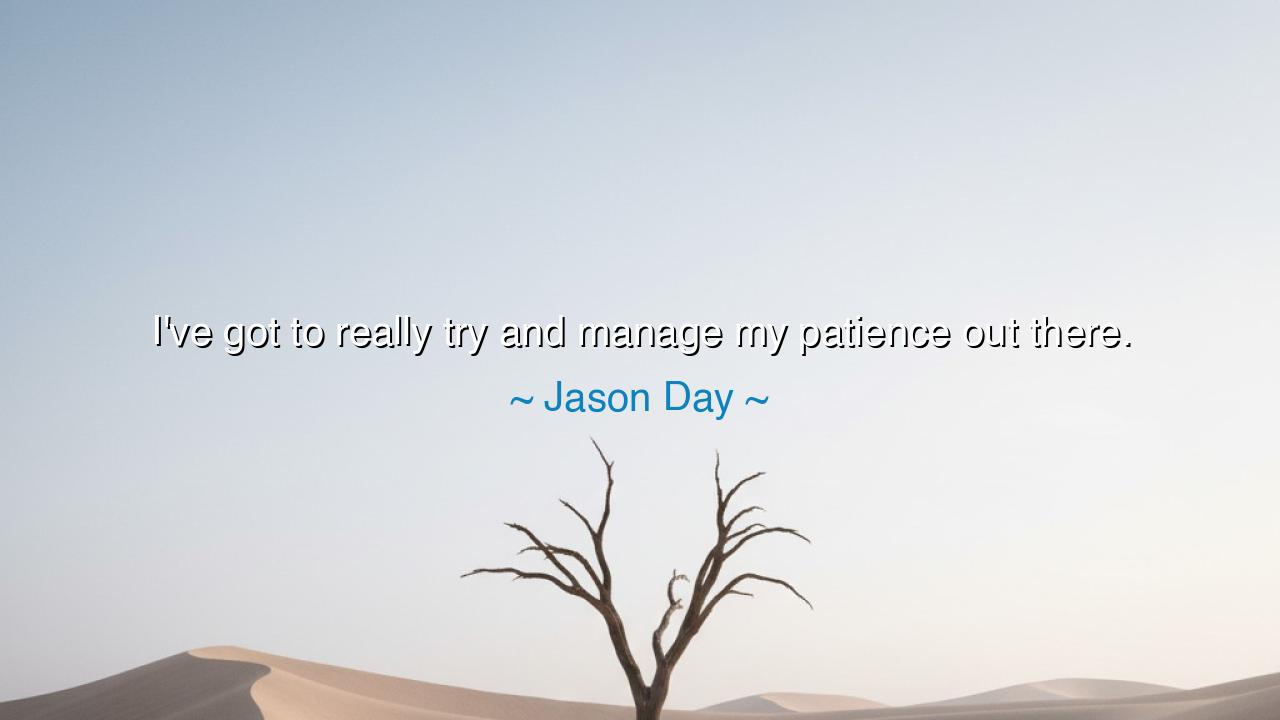
I've got to really try and manage my patience out there.






Jason Day, the champion of the fairways, once declared with humble honesty: “I’ve got to really try and manage my patience out there.” Though spoken in the realm of golf, these words carry wisdom that transcends the sport, echoing truths as old as mankind itself. For what he describes is not merely the challenge of the game, but the eternal struggle of the soul: the discipline of waiting, the art of composure, the heroic act of tempering one’s spirit in the midst of trial.
In the game of golf, victory does not belong to the strongest arm or the swiftest stride, but to the one who can govern his mind. A single error, born of haste or frustration, can unravel hours of steady labor. Thus, Day speaks of patience as a force to be managed—not passively endured, but actively cultivated. He reveals that patience is not weakness, but a weapon; not idleness, but discipline. To manage patience is to wield control over one’s own heart when the winds of fortune blow wild.
The ancients knew this well. The Stoics of Greece and Rome taught that the greatest battle is not against others, but against oneself. Marcus Aurelius, emperor of Rome, sat amidst the turmoil of war and empire, reminding himself that anger and haste are poison, while calm and endurance are strength. His meditations echo Jason Day’s insight: success comes not merely from action, but from the stillness of the mind that governs action. Patience, wisely held, is the root of clarity.
We may recall too the story of Job, the figure of endurance in the ancient scriptures. Stripped of wealth, family, and health, Job bore trials that would have broken the spirit of most men. Yet though he faltered in sorrow, he did not abandon his faith. His patience, tested in fire, became the very symbol of resilience for generations. Jason Day’s words, though about the green fields of sport, reflect the same truth—that life will test us endlessly, and only by guarding patience can we withstand its trials without breaking.
What Day reminds us is that patience must be managed like a scarce resource. It is not infinite; it requires awareness, replenishment, and discipline. On the course, each missed shot threatens to drain it; in life, each setback tempts us to surrender it. To manage patience is to tend it like a flame, shielding it from the winds of despair and frustration, feeding it with breath and resolve. It is an active work, as noble as training the body or sharpening the mind.
From his words arises a lesson for all seekers: in every endeavor—be it sport, labor, art, or the struggles of daily life—learn to master patience. Do not let disappointment drive you to rashness, nor let delay cause you to despair. Instead, breathe, steady yourself, and remain faithful to the path you have chosen. Progress may be slow, but it will come, and fortune favors the steady more than the frantic.
Therefore, O children of tomorrow, take this teaching into your lives: to manage patience is to master yourself. Cultivate it daily, as you would train a muscle or hone a craft. When frustration rises, pause; when defeat looms, endure; when success delays, wait with strength. For as Jason Day reminds us, patience is not merely a virtue for sport—it is the foundation upon which all triumphs, great and small, are built. And he who masters patience shall never be defeated, for time itself will become his ally.






AAdministratorAdministrator
Welcome, honored guests. Please leave a comment, we will respond soon